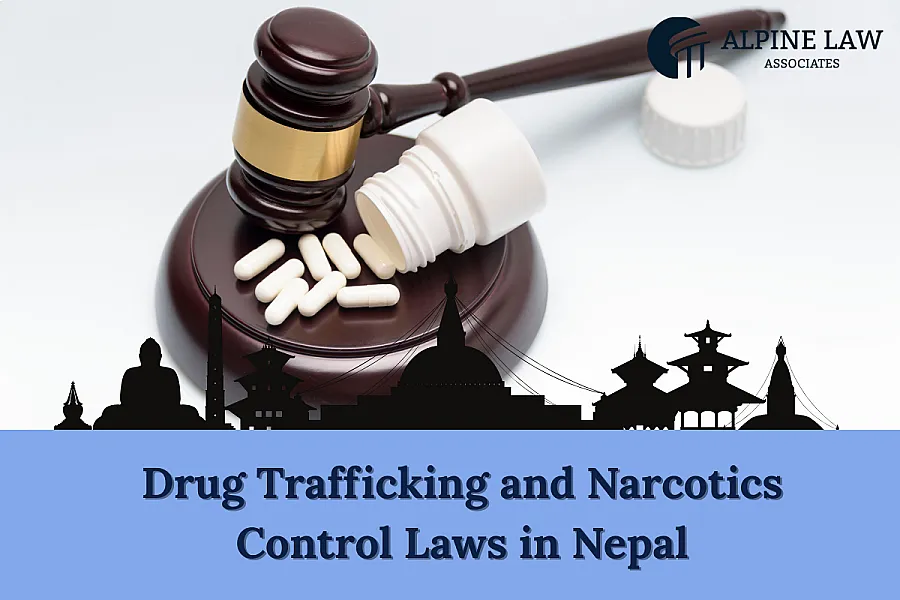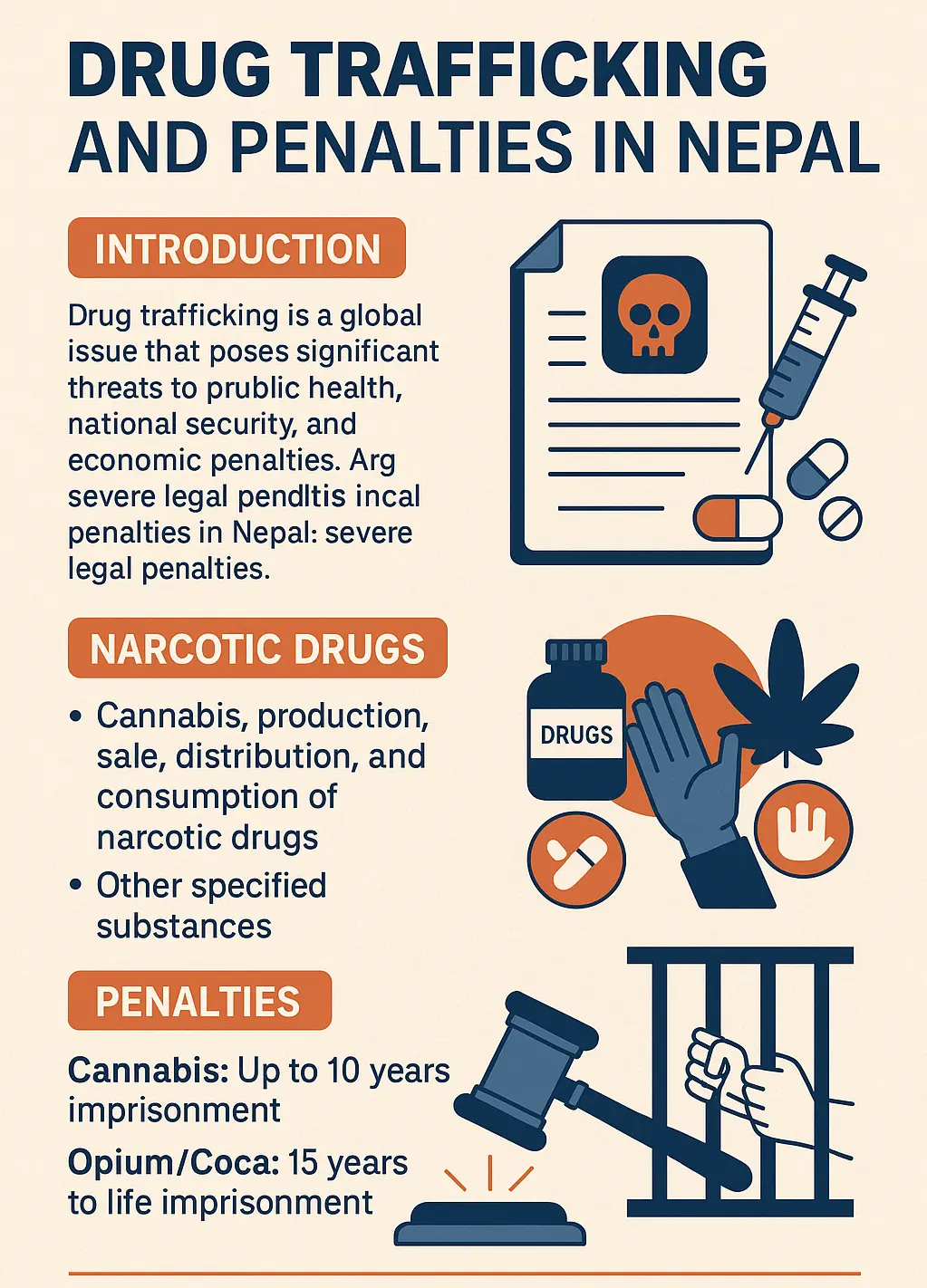
Table of Contents
Introduction
Drug trafficking is a major global issue that poses significant threats to public health, national security, and economic development. It involves the illegal cultivation, manufacture, distribution, and sale of substances that are subject to drug prohibition laws. Drug trafficking not only fuels organized crime but also contributes to violence, corruption, and social instability in many parts of the world. Despite strict national and international laws aimed at controlling the illicit drug trade, the demand for narcotics continues to rise, making drug trafficking one of the most lucrative and persistent criminal enterprises. Understanding the root causes, impacts, and legal responses to drug trafficking is essential for developing effective strategies to combat this complex problem.
Narcotic drugs mean (Narcotic Drugs Control Act 2033)
- Cannabis/ marijuana
- Medicinal cannabis/ marijuana
- Opium
- Processed opium
- Medicinal opium
- Plants and leaves of coca, and
- Any substances to be prepared by mixing opium and extract of coca, including a mixture of salt.
- Any natural or synthetic narcotic drug or psychotropic substances and their salts and other substances as may be specified by the Government of Nepal by a notification published in the Nepal Gazette, from time to time.
Prohibited Acts
No person shall:
- Cultivate, produce, prepare, purchase, sell, distribute, export or import, conduct any trafficking, store, or consume cannabis/ marijuana,
- Cultivate opium or coca or produce opium or coca leaves or other narcotic drugs,
- Manufacture or prepare narcotic drugs,
- Sell or distribute narcotic drugs,
- Export or import narcotic drugs,
- Purchase, store, possess, or conduct any trafficking of narcotic drugs,
- Consume narcotic drugs other than cannabis/ marijuana.
Non-applicability of Prohibitions:
Consumption of narcotic drugs by persons falling under the following categories in the following circumstances shall not be deemed to have been prohibited: -
(a) Purchase and consumption of a narcotic drug by any person in the recommended dose from any licensed shop on the recommendation of any recognized medical practitioner for the purpose of medical treatment.
(b) Consumption of narcotic drugs by persons belonging to the prescribed categories in prescribed doses.
Penalties
1. Cannabis
- Anyone who consumes cannabis/ marijuana shall be punished with an imprisonment for a term up to one month or with a fine of up to two thousand rupees.
- Anyone who cultivates up to twenty-five cannabis/ marijuana plants shall be punished with an imprisonment for a term of up to three months or with a fine of up to three thousand rupees.
- Anyone who cultivates more than twenty-five cannabis/ marijuana plants shall be punished with an imprisonment for a term of three years or with a fine from five thousand to twenty-five thousand rupees.
- Anyone who produces, prepares, purchases, sells and distributes, exports or imports, traffics, and stores cannabis/ marijuana shall be punished as follows:-
- With an imprisonment for a term up to three months or with a fine up to rupees three thousand, if it is up to fifty grams.
- With an imprisonment for a term from one month to one year and with a fine from one thousand to five thousand rupees, if it is within fifty grams to five hundred grams.
- With an imprisonment for a term from six months to two years and with a fine from rupees two thousand to ten thousand, if it is within five hundred grams to two kilograms.
- With an imprisonment for a term from one year to three years and with a fine from rupees five thousand to twenty-five thousand, if it is within two kilograms to ten kilograms.
- With an imprisonment for a term from two years to ten years and with a fine from fifteen thousands to one lakh rupees, if it is ten kilograms or more than this.
2. Opium/ Coca
- Anyone who consumes opium, coca, or any other narcotic drugs made therefrom shall be punished with an imprisonment for a term of up to one year or with a fine up to ten thousand rupees.
- Anyone who cultivates opium poppy or coca bush shall be punished as follows:
- With an imprisonment for a term of one year to three years or with a fine of five thousand rupees to twenty-five thousand rupees, in case of the cultivation of twenty-five plants.
- With an imprisonment for a term from three years to ten years and with a fine from twenty-five thousand rupees to two hundred thousand rupees in case of cultivation of more than twenty-five plants.
- Anyone who commits any other prohibited acts other than the consumption of opium, coca, or any other narcotic drugs made therefrom and the cultivation of such plants shall be punished as follows:
- With an imprisonment for a term from five years to ten years and with a fine from five thousand rupees to twenty-five thousand rupees for anyone doing a transaction up to twenty-five grams.
- With an imprisonment for a term from ten years to fifteen years and with a fine from seventy thousand rupees to two lakh rupees for anyone doing a transaction from twenty-five grams to one hundred grams.
- With an imprisonment for a term from fifteen years to life imprisonment and with a fine from five lakh rupees to twenty-five lakh rupees for anyone doing a transaction of any quantity more than one hundred grams.
- Anyone found addicted to natural or synthetic narcotic drugs, psychotropic substances, or any other substances specified by the Government of Nepal in the Nepal Gazette may face a punishment of up to two months of imprisonment, a fine of up to two thousand rupees, or both. Additionally, anyone involved in prohibited acts related to such substances, excluding mere addiction, may be punished with imprisonment ranging from two to ten years and a fine between one lakh and twenty lakh rupees.
In conclusion, drug trafficking remains a complex and persistent global problem that undermines public health, security, and socio-economic development. The Narcotic Drugs Control Act of Nepal outlines a comprehensive legal framework to address this issue by defining narcotic drugs, listing prohibited acts, and prescribing strict penalties for violations. While the law provides certain exceptions for medical use, it enforces severe punishments for activities such as cultivation, distribution, and consumption of narcotics. Despite these legal measures, the ongoing demand and profit from illicit drugs continue to challenge enforcement efforts. Therefore, a balanced approach involving prevention, treatment, and stricter enforcement is essential to combat drug trafficking effectively.
Disclaimer:
This article is intended solely for informational purposes and should not be interpreted as legal advice, advertisement, solicitation, or personal communication from the firm or its members. Neither the firm nor its members assume any responsibility for actions taken based on the information contained herein.


